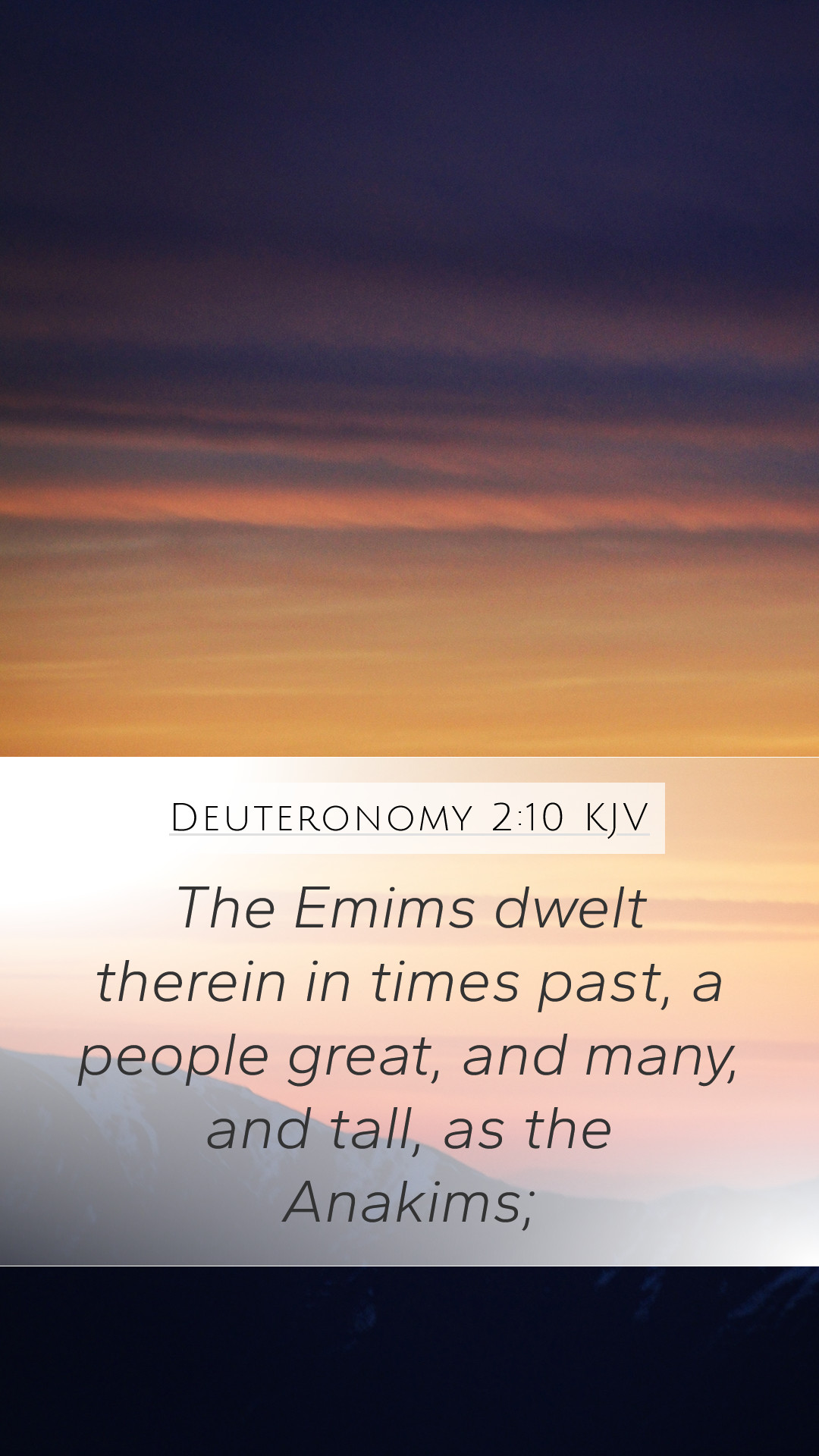Understanding Deuteronomy 2:10
Verse: Deuteronomy 2:10 - "The Emim dwelt therein in times past, a people great, and many, and tall, as the Anakims;"
Verse Meaning and Interpretation
Deuteronomy 2:10 presents a historical account of the Emim, an ancient people characterized by their size and number. This verse serves to convey several layers of meaning and significance within the broader narrative of Israel's journey to the Promised Land. Below are insights combined from notable public domain commentaries.
-
Matthew Henry's Commentary:
The mention of the Emim emphasizes the formidable presence of nations that the Israelites would encounter. Henry highlights that the great stature of these people reflects the challenges Israel faced—both physical and spiritual. Understanding the Emim's existence serves as a reminder of God's power in overcoming giants in our lives, suggesting that no opposition is too great when one is under divine protection.
-
Albert Barnes' Notes:
Barnes notes that the Emim were described as "great and many," which serves to amplify the fears and challenges faced by the Israelites. He argues that knowing the history of these formidable nations provides a context for understanding God's promise to protect and lead His people through their struggles. This highlights the need for courage and faith when confronting seemingly insurmountable obstacles.
-
Adam Clarke's Commentary:
Clarke offers an analysis of the Emim, connecting their legacy to the Anakim, which reflects on the interconnectedness of the peoples residing in the land of Canaan. His examination stresses the lineage and the historical implications of the Israelites' conquest, portraying it as a fulfillment of God's covenant. Clarke encourages readers to view these accounts through the lens of divine sovereignty and redemptive history.
Key Themes
This verse touches on several significant themes relevant to biblical study:
- The Greatness of God: The mention of intimidating nations demonstrates God's ability to deliver His people against overwhelming odds.
- Covenant and Promise: The historical reference to the Emim underscores God's faithfulness in fulfilling His promises to Israel.
- Faith in Adversity: The Israelites are encouraged to remember past adversities and God's past deliverances, reinforcing the idea of faith amidst challenges.
Application to Daily Life
Believers today can derive several life applications from Deuteronomy 2:10:
- Overcoming Fear: Just as God empowered Israel to confront their fears, individuals are encouraged to trust in God's strength to overcome life's challenges.
- Recognition of Spiritual Warfare: Understanding the historical giants that Israel faced can parallel the spiritual giants we confront today—this calls for reliance on God's strategies.
- Encouraging Bold Faith: The legacy of the Emim serves as a potent reminder of faith as a tool to face large obstacles, encouraging Christians to confront their own challenges with confidence.
Related Bible Cross References
- Numbers 13:22 - Reference to the Anakim and the fear instilled in the Israelite spies.
- Deuteronomy 2:11 - Further description of the Anakim and their stature.
- Joshua 11:21-22 - The account of the Anakim being driven from the land by Joshua.
- Isaiah 26:15 - God’s promise to protect and increase His people in the land.
- 2 Samuel 21:16-22 - An account of David’s encounters with giants.
Conclusion
In summary, Deuteronomy 2:10 not only documents historical facts about the Emim but also serves as a platform for deeper biblical study insights. By applying the interpretations from respected commentaries, readers can enhance their understanding of scripture and implement the lessons found in this passage into their lives.


